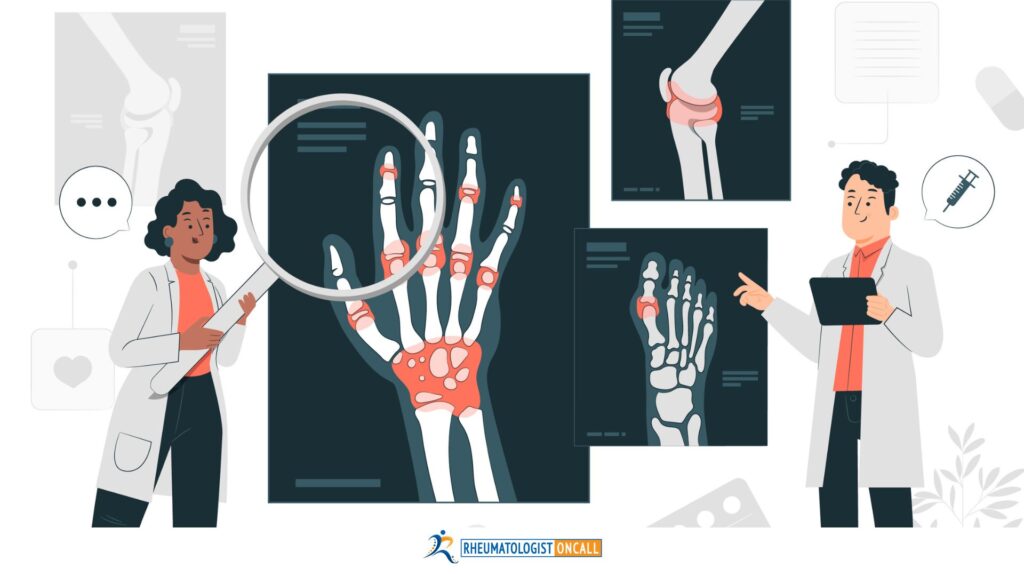SHARE
Rheumatoid Arthritis (RA) is an autoimmune disease that causes chronic inflammation and pain in the joints. It affects over 1% of the global population, impacting people of all ages. Despite its prevalence, there are many myths and misconceptions surrounding RA. This article will debunk the most common Rheumatoid Arthritis (RA) myths with scientific facts to help you truly understand this complex condition.
What Causes Rheumatoid Arthritis
Before diving into common myths, let’s first review what actually causes rheumatoid arthritis. This will give you the proper framework to analyze what is fact versus fiction when it comes to RA.
The Autoimmune Connection
RA occurs when the body’s immune system attacks healthy tissues in the joints. This leads to inflammation, pain, and joint damage over time. Researchers still do not know exactly what triggers this autoimmune response, but both genetic and environmental factors play an important role.
Who Is at Risk?
While RA can begin at any age, onset most commonly occurs between ages 30-60 years old. There also tends to be a hereditary connection, as people with an RA-affected first-degree relative have a higher risk of developing the disease.
Hormones, smoking, and environmental exposures may contribute to already existing genetic risks. Females are also up to three times more likely to develop rheumatoid arthritis than men.
Debunking 5 Common Rheumatoid Arthritis Myths
Now that we have covered rheumatoid arthritis basics, let’s explore where myths about this disease often arise. By understanding the truths behind each, you will have a more accurate understanding of what RA really entails.

Myth #1: Rheumatoid Arthritis is an Elderly Person’s Disease
There is a common public perception that rheumatoid arthritis mainly impacts the elderly. In reality, this myth could not be further from the truth. Here are the facts:
- Onset of RA symptoms frequently occurs between ages 30-50 years old during peak working life
- Juvenile rheumatoid arthritis impacts children under age 16 years old
- Progression of RA at a young age can severely impact quality of life over time
Yes, anyone can get RA at any stage of life. However, the typical onset does not correlate with old age. Recognizing this helps younger people identify early symptoms for early diagnosis and life-changing treatments.
Myth #2 Cracking Knuckles Causes Rheumatoid Arthritis
Does knuckle cracking lead to inflamed and painful joints down the road? Despite the nagging fears surrounding this habitual practice, science says no. There is no evidence to prove knuckle cracking causes any type of arthritis. Knuckle cracking produces a harmless release of gas to create the “pop” sound. Arthritis arises from tissue inflammation in joints rather than any structural damage from cracking. While frequent knuckle cracking may annoy those around you, it will not inflame your joints later in life.
Myth #3 RA Impacts Only Your Joints
Given RA manifests through symptoms of joint pain, swelling, and stiffness, one may assume it localizes its attack only to joint structures. Here is a wake-up call about the widespread impacts throughout the body:
RA is a Systemic Disease.
The inflammatory response within joints represents just the tip of the iceberg. Just about any body system or organ can develop issues over time due to uncontrolled inflammation, including:
- Eyes: Dryness, pain, impaired vision
- Lungs: Scarring, nodules, pleural effusions
- Heart: Pericarditis, cardiomyopathy
- Blood Vessels: Atherosclerosis
- Nervous System: Cervical myelopathy, neuropathy
- Skin: Rashes, nodules
- Blood: Anemia
Clearly, RA impacts way more than just joints alone. Treating the underlying immune system imbalance is crucial to prevent damage to other organs.
Myth #4 Special Diets Can Cure RA
Could following a paleo, carnivore or other special diet cure rheumatoid arthritis for good? You can likely find tons of anecdotal claims about certain diets “curing” RA symptoms. Unfortunately, RA is not a disease that we can cure at this time. However, what you eat will impact the way that you feel with RA. That said, tailored nutrition can make a meaningful impact by:
- Complementing medications to lower inflammation
- Providing symptom relief
- Preventing flare-ups
- Controlling weight to limit joint impact
- Boosting energy levels
It is best to work with an experienced rheumatologist to develop the best anti-inflammatory diet for your lifestyle and RA status. In my practice, Rheumatologist OnCall, the nutrition of the patients is a critical component of treating patients and a way to speed the remission time.
Myth #5 Exercise Worsens RA Inflammation
Could staying active with rheumatoid arthritis exacerbate painful symptoms? Concerns over worsening inflammation cause many newly diagnosed patients to avoid exercise altogether. This myth keeps people inactive despite immense benefits from regular, low-impact movement:
However, exercise in RA
- Helps joints maintain flexibility and range of motion
- Strengthens supportive muscles around joints
- Sustains bone health to prevent osteoporosis
- Boosts balance and coordination
- Lessens fatigue
- Elevates mood
In our practice, we have worked with an experienced physical therapist that provides great guidance when it comes to what exercises are best for RA patients. Avoiding activity completely often aggravates rheumatoid arthritis symptoms over the long run.
Getting Answers for Your Rheumatoid Arthritis from Home
After reviewing the realities surrounding rheumatoid arthritis in this guide, you may feel more empowered yet also have lingering questions. Seeking answers enables you to take control of health decisions relating to your RA diagnosis, treatment plan, and symptom management.
However, actually connecting with a rheumatology specialist is unfortunately easier said than done for many patients. Limited availability, mobility issues, chronic fatigue, high costs, and other barriers get in the way of in-person appointments.
Telemedicine now breaks down many of these obstacles through online video visits. Tap into on-demand access to top rheumatologists nationwide without leaving your home.
See a Rheumatologist Immediately with RheumatologistOnCall
RheumatologistOnCall pioneered rheumatology telemedicine to expand access to top specialists across many US states. Their expert physicians have deep experience specifically diagnosing and developing personalized treatment regimens for those living with RA.
Benefits of online visits through RheumatologistOnCall include:
- Immediate openings for evaluation of your condition
- Follow-up monitoring of disease activity and treatment efficacy
- Medication adjustment guidance as symptoms and needs evolve
- Ability to send messages to your physician anytime
- Avoidance of mobility, distance, and COVID-19 challenges
Do not let inconvenient barriers or lack of local specialists keep you from rheumatology care essential to improving numerous aspects of living with RA. Take advantage of telemedicine advances today by booking an online visit with RheumatologistOnCall to discuss your rheumatoid arthritis plan or any unresolved concerns.














